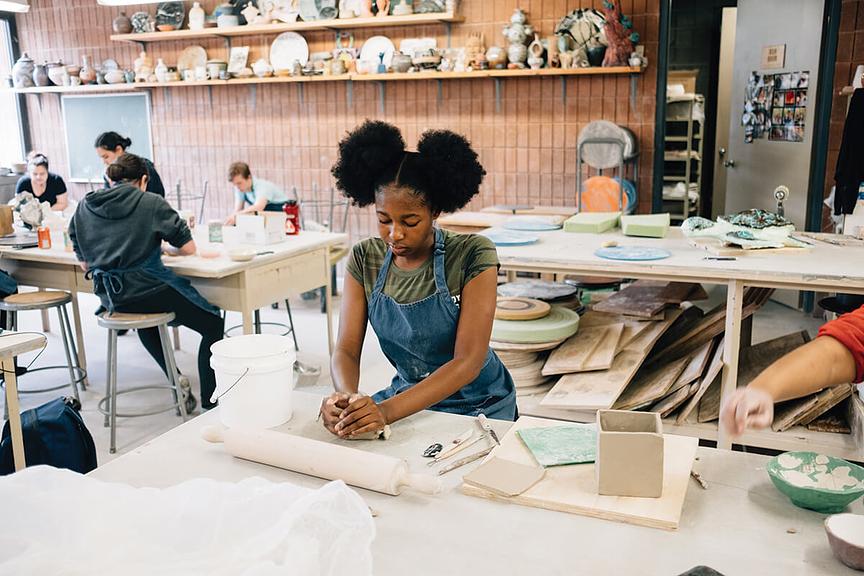Manchester Craftsmen’s Guild is dedicated to educating and inspiring urban youth through the arts. Founded in 1968 after the assassination of Martin Luther King Jr., this acclaimed arts education program has a storybook-like history. Started by Bill Strickland, an underserved teenager in one of Pittsburgh's poorest neighborhoods, MCG is now housed in a world-class facility on Pittsburgh's North Shore, where students are surrounded by art, architecture, music, food, flowers, and natural light.
Bill Strickland was a struggling and disaffected high school student by his own admission. One fateful day he passed the open door to the art room where teacher Frank Ross was working on the potter’s wheel. Awestruck by the sight of a skilled artisan, Strickland approached the teacher. Over the coming months, the relationship that Ross and Strickland initiated with a revolving mound of clay began to give form to the future vision of Manchester Craftsmen’s Guild, Bill Strickland’s vision for a school.
“We have to build places of hope rather than places of despair. The public school system here is built to contain kids, not educate them. If you build prisons, you create prisoners.” - Bill Strickland
Today, MCG’s flagship program is afterschool art classes, provided at no cost to Pittsburgh Public School students. Additionally, MCG serves a variety of students through daytime programming. This includes some of the most disadvantaged youth in Allegheny County through a partnership with the Department of Human Services, as well as a variety of partnerships with private and charter schools.
Students learn from and create alongside MCG's teaching artists, who are all practicing, professional artists. In addition to being full time employees (with full benefits) MCG's teaching artists are celebrated annually with a staff exhibition and reception, which now includes the work of local public-school art teachers. Several teaching artists are former MCG students, which further illustrates the value of this program.
The primary goal of engaging students through the arts is to build confidence and facilitate the mentoring process, however students also gain practical skills and a more complete understanding of science and technology. Since MCG’s inception, students in the ceramics studio have been learning chemistry, and photography students have been applying math. Recently digital arts students have been learning materials science, especially related to 3-D printing, CNC routing, and laser engraving.
MCG engages families and the community in several ways. Families and community members may attend three open-house "family nights" annually in addition to several free public art events, a component of our artist-in-residence program. World-class, professional artists mentor MCG students and exhibit their work in the building’s gallery. Art classes for adults (with discounts and Act 48 credit hours for educators) are also made available. In addition to these events, MCG has presented its ninth year of the MCG Invitational Arts Exhibition, through which MCG facilitated the giving of around $300,000 in scholarships, cash prizes, and workshop opportunities to talented high school artists in the Western PA region.
MCG’s replication efforts have established ten sites in North America, and one very special site in Acre, Israel, where Jewish and Arab students learn side by side, the same way black and white students do in Pittsburgh. More than 27 U.S. locations and five international locations have expressed interest in adapting this model to their cities. These efforts would not be possible without strong partnerships with local, state, federal, and even international governments. Founder, Bill Strickland, sat on President Obama's Council for Community Solutions and recently joined Pittsburgh's mayor on a trip to India to once again meet with the Dalai Lama.
MCG’s teaching artists serve as the primary mentors; however students are also provided with access to a robust student services department, which includes a dedicated college and career planning specialist. Our annual survey of seniors shows that 94% of interviewed students who attended MCG graduated on time, and 94% planned on enrolling in post-secondary education.
In 2019, MCG was honored to be included in HundrED’s Pittsburgh Spotlight for its innovative approach to providing youth apprenticeship training in a beautiful environment. In response to the COVID-19 pandemic MCG has broadened its scope of services and resources to address social-emotional learning through a series of wellness-focused workshops, food insecurity by providing fresh produce to families through a partnership with 412 Food Rescue, and loss of learning by developing a course development tool in partnership with Tufts University’s “Code for Good” program that will allow teaching artists to align course content to PA Academic Standards. In addition, MCG has adapted its beautiful culture and environment for a virtual setting in order to ensure high quality arts programming and mentorship, whether delivered in-person or remotely in the future.



